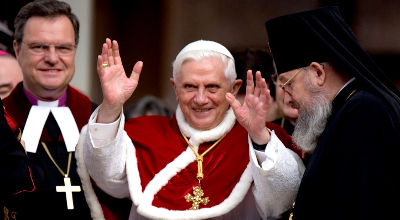What Would Reformer Martin Luther Think About the Catholic Invitation?
Two leading Lutheran clerics have rejected suggestions from the Vatican that it could create a subdivision for converted Lutherans similar to its structures for Anglicans who join the Roman Catholic Church.
The dispute, concerning tiny numbers of believers but major issues in ecumenical relations, comes as the churches mark the annual Week of Prayer for Christian Unity this week.
The Rev. Martin Junge, the Chilean-born secretary general of the World Lutheran Federation (WLF), said in a statement that the suggestion caused great concern and would “send wrong signals to LWF member churches around the world.”
Bishop Friedrich Weber, the German Lutheran liaison with the Catholic Church, said the idea was unthinkable and amounted to “an unecumenical incitement to switch sides.”
The Vatican announced special structures for disaffected Anglicans in 2009, creating a so-called ordinariate so conservatives opposed to female and homosexual bishops could become Catholic while retaining some of their traditions.
Several thousand Anglicans, including dozens of priests and a few bishops, have joined ordinariates established in England, Australia and Canada. Married clergy are exempted from the obligatory celibacy of the Catholic priesthood.
Relations among Christian churches have improved greatly since the 1962-1965 Second Vatican Council and most now see each other more as partners than as competitors. A Catholic bishop attended an ecumenical service Weber celebrated last Sunday.
But this Vatican welcome has raised suspicions among some Protestants that the huge Catholic Church, which makes up half the world’s 2.2 billion Christians, now wants to woo away believers from smaller churches torn by internal debate.
Irritations Over the Reformation
While the Vatican’s opening to Anglicans followed years of bitter public splits in that church, very few of the world’s 75 million Lutherans seem interested in reunification with Rome.
Cardinal Kurt Koch, head of the Pontifical Council for Christian Unity, said last October the Vatican would consider creating an ordinariate if Lutherans asked for one.
Archbishop Gerhard Mueller, head of the Vatican’s powerful doctrinal office, was reported in Catholic media last week as saying Rome might envisage a special section for Lutherans.
Junge said very few Lutherans wanted to switch to the Catholic Church and creating a special subgroup for them would complicate ties between the churches and confuse Lutherans who wanted to work in harmony with Catholics.
“Creation of such a special structure would have deep ecumenical repercussions,” he said, mentioning the issue of how Christianity should be organized. Catholicism is united under the pope while Protestant churches are decentralized.
Weber told the German Protestant news agency Idea that Lutherans desiring full communion with Rome should simply join the Catholic Church rather than seek a special status in it.
He said subjugation to papal authority was alien to the Lutheran view of religious freedom, which Martin Luther set out after he challenged the corrupt papacy in 1517 with the 95 Theses that led to the Protestant Reformation.
Catholic-Lutheran relations have improved to the point that in 1999 they declared the theological dispute over justification—the way that believers can get to heaven—that led to the Reformation had been resolved.
But Lutheran plans to celebrate the 500th anniversary of the Reformation in 2017 have irritated German Catholic leaders who find the plan to call it a jubilee too triumphalist.
Initial work on a joint statement about the Reformation for the anniversary has highlighted how deeply the Lutherans see their split from Rome as a positive act and the Catholics view the division of western Christianity as a defeat.
Editor’s Note: What would Martin Luther, who was excommunicated from the Catholic Church and whose teachings serve as the foundation of the Lutheran church, think about the talk of Lutherans aligning with the Catholic church?
Reporting By Tom Heneghan; Editing by Jon Boyle.
© 2013 Thomson Reuters. All rights reserved.














































